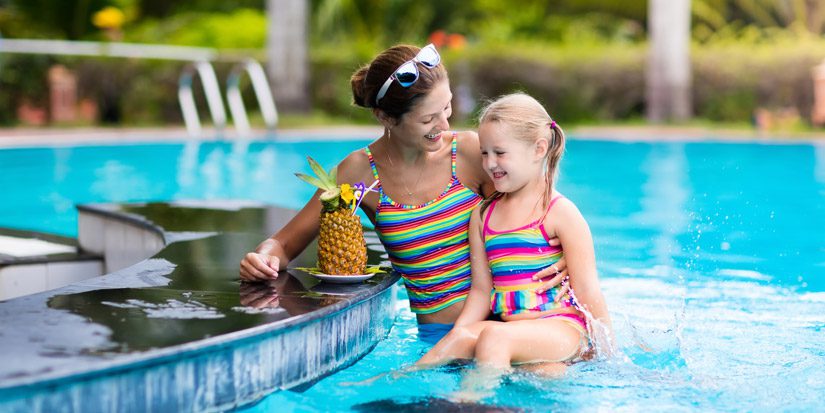If you have a new swimming pool in your back yard, you and your family and friends will stand to get a lot more splash time in this summer! (Yes, we know you’re doing a happy dance right now. And we’re doing one here, excited for you, too!) One issue you may need to consider with all the added swim time you’ll be getting in is planning for swim attire and properly caring for that attire. After all, the more you’ll be using your swimsuits this season, the more they’ll be subjected to pool chemicals, sunscreen, and heat — all of which can be stressful for the fabric.
Considering Chlorine
In case you don’t already have enough convincing reasons to keep pool chemicals in balance, you can add one more to the list: chlorine is harsh on swimwear. Even with chlorine levels in balance, though, the chemical will still take its toll on any fabrics subjected to it. You can ameliorate the issue by having a salt water chlorine generator. Salt water pools still use chlorine, but the chlorine that’s used is gentler than your typical chlorine. (And believe it or not, this upgrade typically costs under $5,000!)
 Planning Activities
Planning Activities
First, you need to realize what it is that damages a swimsuit, keeping in mind that chlorine is only one factor. Perspiration, heat, and sunblock are all elements that can compromise the integrity of the fabric; when those factors combine with chlorine, they can cause even more havoc to your swimwear. So if you plan to swim as well as sunbathe, it’s best to swim first; then change into a dry swimsuit before lying out to soak in some sun. If you sunbathe in a wet suit that’s been subjected to chlorinated water, the heat will combine with the chemicals — and your suntan lotion — to cause added breakdown to the fibers.
Also consider rough surfaces that can cause snagging; swim suit snags cannot be repaired. Especially if you have young children who want to play in the yard or on the patio between dips in the pool, make sure they have cover-ups or alternative clothing to wear for those activities, instead of risking damage to their swimwear. If you’re just sitting out for a minute, at least sit on a towel if you’re sitting on a rough deck surface.
 Selecting Swimwear
Selecting Swimwear
Of course, it stands to reason that if you don’t get the most cheaply made suits out there, your swimsuits will probably last a little longer. Beyond that, you might want to consider purchasing swimsuits designed for serious swimmers. Such swimwear is made from chlorine-resistant fabric and will far outlast the typical models. Even if you don’t want to shop at a specialty store, take a look at the tag: natural fibers such as cotton won’t hold up as well in chlorinated pool water, so if you can find one that’s 100% polyester, that will be your best bet.
No matter what swimsuit you choose, it’s important to care for it properly. More about that in our next post.
We love the difference we can make for your family by providing something that puts years of memories within reach. Call 877-754-5966 for more information.




